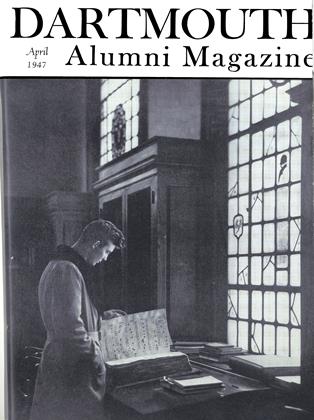THE trouble with the survey of all the courses in the curriculum with which The Dartmouth startled the Hanover community last month is that the results, which are now being published daily, are likely to be confused with sound educational criticism. The Dartmouth's survey is based upon a student poll, and popularity polls are hot criticism. Radio soap opera, for example, is highly popular, and all the surveys prove it. Is radio soap opera therefore art? Then so are false teeth. There are professors at Dartmouth whose courses are perennially popular, and the present survey proves it again; but if every one of these men is therefore a great teacher, then so is Sherwin Cody.
As a popularity poll, The Dartmouth's effort was thorough and well-intentioned, and it marked the first time in the history of the College that a majority student opinion on each course in the curriculum has been ascertained. The editors made up a series of questions, circulated them in the dormitories, tabulated the results, and summarized them in a few paragraphs. But on the whole these were disappointing. Some of Dartmouth's great teachers, who year after year have been famous for the imagination, enthusiasm and force which they bring to their work, were not very popular. Of one, The Dartmouth pointed out with some asperity, that the average grade in his course was "C." Some of the men whose courses are notoriously easy and who pass out high grades like a French general bestowing medals received grateful applause.
Perhaps the disappointing result was due in part to the questions which The Dartmouth asked. A question such as "Are the lectures well organized?" tends to favor the academic plodder who passes out ideas distilled for notebooks. Great teachers like John M. Mecklin and Alexander Meiklejohn who have graced Dartmouth in the past were never noted for the "organization" they brought to the classroom. Their ideas couldn't be filed in notebook sentences, which is one of the ways to recognize a great idea.
But the poll had other results more apparently unfortunate even than the assumption that a good teacher, like a jail bird or an army recruit, can be described on a chart. The poll hurt some feelings badly and unnecessarily ]by pointing out the dullest teachers for everyone in Hanover to read about. The editors evidently thought that by doing so, they would force the College to take action against these men, an assumption which revealed an amazing ignorance of academic tenure, and which resulted in plain cruelty.
The failure of this survey as good criticism raises the question of how real student criticism can be obtained. A recent report of the Committee on Special Rules under the chairmanship of Professor John Stearns has recommended to President Dickey that he investigate a system of student-faculty reaction blanks which has been tried out at Purdue, Michigan and Washington and in which student opinion is registered and the results submitted to the Dean of the Faculty for such action as he thinks best. Such a system would allow a critic's views to be weighted against the critic himself, his grades, attitude, maturity, intelligence and enthusiasm. It might make for better teaching and it would result in real criticism rather than majority expression. If the majority were good critics, profound artists like Orozco ought not to be allowed to decorate walls. The works which adorn the ceilings of hotel dining rooms are more popular, by far.
 View Full Issue
View Full Issue
More From This Issue
-
 Article
ArticleFreedom of the Screen
April 1947 By WALTER WANGER '15 -
 Article
ArticleCharles Edward Hovey '52
April 1947 By ALLAN MACDONALD -
 Class Notes
Class Notes1918
April 1947 By ERNEST H. EARLEY, DONALD L. BARR -
 Article
ArticleA Challenge Still Unanswered
April 1947 By BUDD SCHULBERG '36 -
 Article
ArticleThe Undergraduate Chair
April 1947 By Charles Clucas '44 -
 Class Notes
Class Notes1917
April 1947 By MOTT D. BROWN, DONALD BROOKS
Thomas W. Braden '40
-
 Article
ArticleJohn M. Mecklin, Teacher
May 1940 By Thomas W. Braden '40 -
 Article
ArticleAutumn Days
November 1946 By Thomas W. Braden '40 -
 Article
ArticleA Clear Line
February 1947 By Thomas W. Braden '40 -
 Books
BooksINDIRECTIONS
April 1947 By Thomas W. Braden '40 -
 Feature
FeatureOur Battle To Reform The Education of Teachers
DECEMBER 1964 By THOMAS W. BRADEN '40 -
 Article
ArticleThe Freedom to Choose
OCT. 1977 By THOMAS W. BRADEN '40
Article
-
 Article
ArticleTHE WYMAN TAVERN AT KEENE, NEW HAMPSHIRE
March 1920 -
 Article
ArticleLITERARY MAGAZINE ESTABLISHED
June, 1922 -
 Article
ArticleFounding Presidents
APRIL 1994 -
 Article
ArticleThe Undergraduate Chair
December 1941 By Craig Kuhn '42 -
 Article
ArticlePARAPHRASE
March 1931 By Edwin R. Frost '30 -
 Article
ArticleClass Scheduling Revised.
FEBRUARY 1966 By R.J.B.

